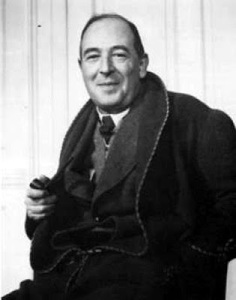 I’m busily writing what I hope will be a book about C. S. Lewis’s influence on Americans. I’ve analyzed the survey that 87 individuals responded to, and hope to get that published. I’ve also written the preface and the first two chapters. Here’s an excerpt from that preface. Keep in mind this is a draft, but I trust it is worth your read today:
I’m busily writing what I hope will be a book about C. S. Lewis’s influence on Americans. I’ve analyzed the survey that 87 individuals responded to, and hope to get that published. I’ve also written the preface and the first two chapters. Here’s an excerpt from that preface. Keep in mind this is a draft, but I trust it is worth your read today:
I grew up in Bremen, Indiana, population roughly 4,000, surrounded by corn fields and a significant Amish community, half a world away from Oxford and in an entirely different environment. My parents had never read any of Lewis’s works; there was nothing in my background to lead me in that direction. By the end of the decade of the 1950s, I could ride a bike and fill my bike’s basket with books from our local public library, a feat I accomplished consistently. Already, before the age of ten, I was a voracious reader. Yet I never borrowed anything in the library by C. S. Lewis. All of his Narnia books had been published by then, but if they were in that library, they never crossed my path, and my affinity for fantasy/science fiction reading surely would have dredged them up if they existed.
Since I knew nothing of Lewis in 1960, it is no surprise that I had no knowledge that his wife, Joy, died that July. It would have had no meaning. When Lewis himself died on November 22nd, 1963, again I took no notice. But I wasn’t alone: the whole world was startled and anxious over the death of another man that the world deemed more consequential. As the president of the United States was placed in his grave shortly afterward, so was C. S. Lewis. Today, which of those two is of more consequence?
So when did I first make an acquaintance with Lewis? It might have been in high school, but if so, the memory is dim. Sometime during my college years, though, he entered my world, and in a big way. I don’t recall which of Lewis’s books I read first. Was it The Screwtape Letters? That’s possible. Or perhaps it was Out of the Silent Planet, followed by Perelandra and That Hideous Strength, the so-called Space Trilogy that would have appealed to my science fiction bent. Then there was The Great Divorce, which fascinated me as I followed Lewis’s fantasy bus trip from hell to heaven. I also recall, although faintly, that I delved into some of his more substantive treatises to help bolster my burgeoning Christian faith. I think The Problem of Pain, Miracles, and The Abolition of Man made my reading list during those years at Purdue University.. . .
The years have passed quickly (as people my age invariably say) and my respect for Lewis has only increased over time. Pushed to the back burner of my thoughts–due to so many other obligations as a professor of history–was the idea of a book of some kind that I could write on Lewis. The desire was present, but I just wasn’t sure what it could be.
While on a cruise ship in March of 2013, I was reading Alister McGrath’s recent biography of Lewis. Near the end, he made a statement about Lewis and Americans that stuck in my mind: “Lewis has always been appreciated more in the United States than in England.” That one sentence sparked a thought: Why hasn’t anyone written a book specifically focused on the impact Lewis made on Americans? I tucked that thought away for a more opportune time. . . .
Why another book on C. S. Lewis? When one finds an itch that hasn’t yet been scratched, it is incumbent on the one who finds that itch to do some scratching. This book contains the testimonies of many Americans who have found Lewis to be a faithful guide as they walk out the implications of their Christian life. I decided to include my testimony up front, and add my thanks to all the others. May this volume provide greater light on the man who has shown so many the light of Christ and the path His followers must take.
I trust this excerpt provides some idea of where I’m going with this. If anyone reading this would like to pray that I find a publisher, I won’t mind at all.
